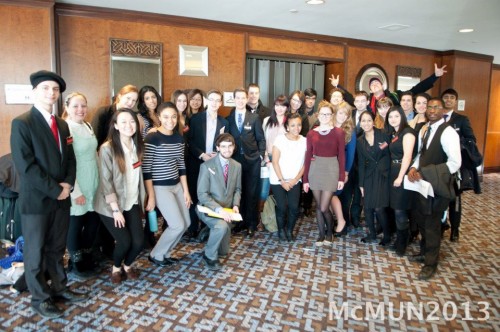You get the idea.
I’m always the only Accounting major, and there are a scattered few in Science, Engineering, or Business.
So this got me thinking: how much does your major come into play, both as a delegate and as conference staff? Do Political Science students have an advantage? I asked people involved in MUN at McGill, and this is what they had to say:
Management Student: I think that on the organizational side of Model UN, McMUN and SSUNS in particular [the two McGill-run conferences], there is a wealth of knowledge and ideas but a huge lack of management. I have been studying management for 3 years now and I feel like I have a much better understanding than most Model UN people about what is involved in managing and leading a team.
Engineering Student: Engineering requires analysis of different situations, which is always beneficial, particularly in model UN. Not being forced to work or study IR gives the freedom to do it in your own time and pace, but that time can be lacking. So since you make the time to do it, you make the most of it every time.
Psychology Student: Our training and knowledge of mental heuristics and biases allow us to participate in MUN on a different level than the typical Political Science major, especially when it comes to crises. A lot of what happens in crises has to do with timing. As a delegate you have to understand where the crisis director is trying to take the committee, and at what speed he or she is trying to do so, and tailor your action directives accordingly.

The ICC committee at McMUN 2013, where the Dais Staff and Committee Directors are Poli Sci, Accounting, Finance, Economics, and Law majors, just to name a few.
However, students did note some common disadvantages, the main one being that
“the amount of Model-UN related knowledge that I have [is lacking]… I am not always aware of all of the intricacies and developments of International Relations related news.”
From my own experience, even side comments about some current happenings or political science jargon, have caught me off guard.
However, a Political Science student offered an interesting insight, saying that while they learn technical terms and theories that help in committee, he sees no real advantage over other students when it comes to research. He also did note that there are many other different types of committees now that students with different majors will have an advantage in, such as a chemical weapons committee where a chemistry major will have a much deeper knowledge than the other delegates.
Truly, one student summed it up perfectly: “ Don’t be afraid. It might seem intimidating to work with people that study IR as a full-time job but if you are doing this as an extra-curricular, there is a passion that you have or develop that helps you keep up. Do MUN with confidence and do it because you want to.”
It is not your major that defines your ability – your passion, drive, and interest reflects in you as a great delegate or an awesome conference organizer. Major in what you are passionate enough, and bring that same passion to MUN!
Tips and Tricks:
– Capitalize on what your major offers you, whether that be public speaking, management skills, or situation analyses.
– Try as much as possible to find committees that align with your major, such as business committees.
– Keep up with the news! Try to read 5 articles a day (a good practice to get into anyway!)
– If possible, take a Poli Sci elective to understand the basic theories and concepts in International Relations.
Many, many thanks to Celine Raymond, Abdaal Mazhar – Shafi, Ani Desai, and Daniel Ecovitch, for contributing their thoughts and perspectives to this article.


